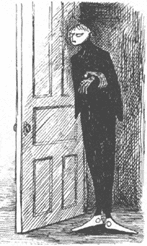This week’s maxim is: Γονεις αιδου, translated in my source as “Respect your parents.” Let’s take a look at this one, shall we? (Both definitions from Liddell & Scott’s Greek-English Lexicon, as usual.)
- Γονεις – This is the accusative plural case (presumably; in -υς nouns the nominative plural and accusative plural are the same) of Γονευς: a father, ancestor: in pl. the parents.
- αιδου – This is the present imperative of αιδεομαι: Deponent verb (ie a verb of middle or passive forms with active sense) to feel shame, be ashamed or fear also to respect, reverence a person: with the infinitive mood, to be ashamed or afraid to do a thing. 2. In Attic Greek, law-term, to feel pity for, hence to pardon, especially in aorist I αιδεσομαι.
Whoof! αιδεομαι is a complicated word, especially if you take the Attic interpretation into account. I think “Respect (your) parents” works all right as a translation, but it’s important to include the connotations of fear and reverence.
This is one that I think really shows its age. Back in Classical Greece, there was a far more structured social hierarchy than what we have today, and it placed parents firmly above their children. If Dad says “jump,” you say “how high?” We give children a lot more agency nowadays — child abuse/neglect is a recognized thing, for example. That you popped out a kid doesn’t automagically make you someone they have to obey. Plenty of parents lose their right to claim the respect of their children by doing harmful or neglectful things to them. I would never tell the child of, say, a physically abusive parent to “respect your parents.”
However, speaking in general of parents-who-do-not-suck, I think respecting your parents is important. For one thing, being a parent is fucking hard, and good parents put a lot of thought into it. Most parents have way more experience than their children do, and experience is to be respected.
But I think that respect is a two-way street. Parents need to respect their children, as well — to see them as the individual (if often inexperienced and naive) people they are. If that respect isn’t there, neither should the respect described in this maxim.



